Hecate or Hekate is a goddess in ancient Greek religion and mythology, most often shown holding a pair of torches or a key and in later periods depicted in triple form. She is variously associated with crossroads, entrance-ways, night, light, magic, witchcraft, knowledge of herbs and poisonous plants, ghosts, necromancy, and sorcery. Her earliest appearance in literature was in Hesiod's Theogony in the last third part of the 8th century BCE as a goddess of great honor with domains in sky, earth, and sea. Her place of origin is debated by scholars, but she had popular followings amongst the witches of Thessaly and an important sanctuary among the Carians of Asia Minor in Lagina.

Robert Leroy Johnson was an American blues guitarist, singer, and songwriter. His landmark recordings in 1936 and 1937 display a combination of singing, guitar skills, and songwriting talent that has influenced later generations of musicians. He is now recognized as a master of the blues, particularly the Delta blues style.

Papa Legba is a loa in Haitian Vodou, who serves as the intermediary between the loa and humanity. He stands at a spiritual crossroads and gives permission to speak with the spirits of Guinee, and is believed to speak all human languages. In Haiti, he is the great elocutioner. Legba facilitates communication, speech, and understanding. He is commonly associated with dogs.
Eshu is an Orisha in the Yoruba religion of the Yoruba people. As the religion has spread around the world, the name of this Orisha has varied in different locations, but the beliefs remain similar.

Crossroads is a 1986 American coming-of-age musical drama film inspired by the legend of blues musician Robert Johnson. Starring Ralph Macchio, Joe Seneca and Jami Gertz, the film was written by John Fusco and directed by Walter Hill and features an original score featuring Ry Cooder and guitar virtuoso Steve Vai on the soundtrack's guitar, and harmonica by Sonny Terry. Steve Vai also appears in the film as the devil's guitar player in the climactic guitar duel.

Houngan or oungan is the term for a male priest in Haitian Vodou. The term is derived from the Fon word hounnongan. Houngans are also known as makandals.
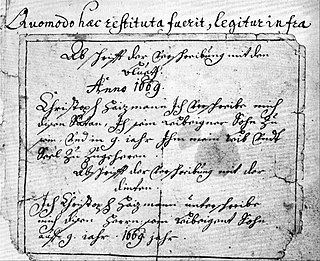
A deal with the devil is a cultural motif in European folklore, best exemplified by the legend of Faust and the figure of Mephistopheles, as well as being elemental to many Christian traditions. According to traditional Christian belief about witchcraft, the pact is between a person and Satan or a lesser demon. The person offers their soul in exchange for diabolical favours. Those favours vary by the tale, but tend to include youth, knowledge, wealth, fame, or power.
Crossroads, crossroad, cross road or similar may refer to:
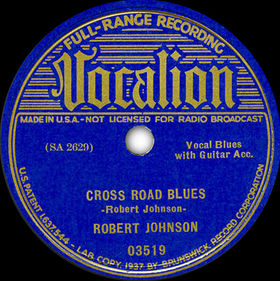
"Cross Road Blues" is a blues song written and recorded by American blues artist Robert Johnson in 1936. Johnson performed it as a solo piece with his vocal and acoustic slide guitar in the Delta blues-style. The song has become part of the Robert Johnson mythology as referring to the place where he supposedly sold his soul to the Devil in exchange for his musical talents, although the lyrics do not contain any specific references.

Circe is a fictional supervillain appearing in DC Comics publications and related media. Based upon the Greek mythological figure of the same name who imprisoned Odysseus in Homer's Odyssey, she is a wicked sorceress and recurring foe of Wonder Woman.
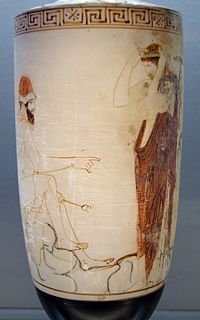
In mythology, the Greek underworld is an otherworld where souls go after death. The original Greek idea of afterlife is that, at the moment of death, the soul is separated from the corpse, taking on the shape of the former person, and is transported to the entrance of the underworld. Good people and bad people would then separate. The underworld itself—sometimes known as Hades, after its patron god—is described as being either at the outer bounds of the ocean or beneath the depths or ends of the earth. It is considered the dark counterpart to the brightness of Mount Olympus with the kingdom of the dead corresponding to the kingdom of the gods. Hades is a realm invisible to the living, made solely for the dead.
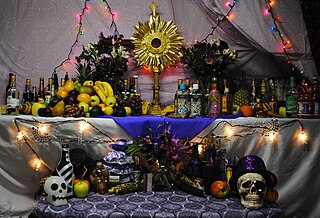
Haitian Vodou is an African diasporic religion that developed in Haiti between the 16th and 19th centuries. It arose through a process of syncretism between the traditional religions of West Africa and Roman Catholicism. Adherents are known as Vodouists or "servants of the spirits".
The Olympian Gods are characters based upon Greek and Roman mythology who appear primarily in Wonder Woman, Captain Marvel and Aquaman comics.

Shin Megami Tensei: Devil Summoner is a role-playing video game developed and published by Atlus. Forming part of the Megami Tensei series, it is the first title in the Devil Summoner subseries. It was first released for the Sega Saturn in December 1995, and received a port to the PlayStation Portable in December 2005. Despite reports of it being planned for localization, neither version has been released outside Japan.
Vodou drumming and associated ceremonies are folk ritual faith system of henotheistic religion of Haitian Vodou originated and inextricable part of Haitian culture.
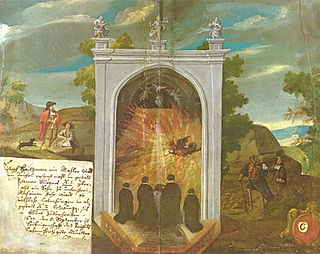
The idea of making a deal with the devil has appeared many times in works of popular culture.

A liminal deity is a god or goddess in mythology who presides over thresholds, gates, or doorways; "a crosser of boundaries". Special types include dying-and-rising deities, various agricultural deities, and those who descend into the underworld: crossing the threshold between life and death representing the most fundamental of all boundaries. Vegetation deities in particular mimic the annual dying and returning of plant life, making them seasonally cyclical liminal deities. In contrast, the one-time ordeal typical of the dying-and-rising myth, or legends of those who return from a descent to the underworld, represent a more narrow scope of liminal deities.
De falsis diis, or, in Classical Latin spelling, De falsis deis, is an Old English homily composed by Ælfric of Eynsham in the late tenth or early eleventh century. The sermon is noted for its attempt to explain beliefs in traditional Anglo-Saxon and Norse gods within a Christian framework through Euhemerisation. The homily was subsequently adapted and circulated by Wulfstan II, Archbishop of York, and also translated into Old Norse under the title ''Um þat hvaðan ótrú hófsk''.












